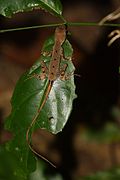Superregnum: Eukaryota
Regnum: Animalia
Subregnum: Eumetazoa
Cladus: Bilateria
Cladus: Nephrozoa
Superphylum: Deuterostomia
Phylum: Chordata
Cladus: Craniata
Subphylum: Vertebrata
Infraphylum: Gnathostomata
Superclassis: Tetrapoda
Cladus: Reptiliomorpha
Cladus: Amniota
Classis: Reptilia
Cladus: Eureptilia
Cladus: Romeriida
Subclassis: Diapsida
Cladus: Sauria
Infraclassis: Lepidosauromorpha
Superordo: Lepidosauria
Ordo: Squamata
Cladus: Unidentata Episquamata Toxicofera
Subordo: Iguania
Infraordo: Acrodonta
Familia: Agamidae
Subfamilia: Draconinae
Genus: Coryphophylax
Species (2): C. brevicaudus – C. subcristatus
Name
Coryphophylax Fitzinger in Steindachner, 1867: 30
Type species: Coryphophylax maximiliani Fitzinger, 1861, by monotypy.
References
Primary references
Steindachner, F. 1867. Zoologischer Theil, Band 1. Reptilien. In: Reise der österreichischen Fregatte Novara um die Erde in den Jahren 1857, 1858, 1859 unter den Befehlen des Commodore B. von Wüllerstorf-Urbair. Kaiserlich-Königlischen Hof-und Staatsdruckerei: Wien. 98 pp. + pl. I–III.
Additional references
Harikrishnan, S. et al. 2012: A new species of Coryphophylax Fitzinger in: Steindachner, 1867 (Sauria: Iguania: Agamidae) from the Andaman Islands, India. Zootaxa 3451: 31–45. Preview Reference page.
Links
Uetz, P. & Hallermann, J. 2021. Coryphophylax . The Reptile Database. Accessed on 3 March 2019.
Coryphophylax is an agamid genus endemic to the Andaman and Nicobar Islands and a sister of the Southeast Asian Aphaniotis. Found in tropical wet forests, they are common in suitable habitats and shows variations across islands and are sexually dimorphic. The genus is absent on Great Nicobar Island, with its southernmost occurrence on the Island of Kondul. The Tsunami of December 2004 may have affected island wise distributions in the Nicobar Islands of several species and also their gene-flow.
Taxonomic history
The species from the Andaman Islands was described by Edward Blyth as Tiaris subcristata in 1860 but technically published in 1861.[1] This species was described by Fitzinger in Steindachner's publication of 1867 and as Tiaris humei by Stoliczka in 1873 and these names are considered junior synonyms but placed in the genus erected by Fitzinger. The closely related genus Aphaniotis (and the more distant Otocryptis) has a concealed tympanum while Gonocephalus has spines on the head or nape.[2]
Species
| Image | Scientific name | Common Name | Distribution |
|---|---|---|---|
 |
Coryphophylax subcristatus (Blyth, 1861) | Short-crested Bay Island forest lizard | India (Andaman Island, Nicobar Island) |
 |
Coryphophylax brevicauda Harikrishnan, Vasudevan, Chandramouli, Choudhury, Dutta & Das, 2012 | Short-tailed Bay Island forest lizard | India (Andaman Islands) |
References
Blyth, E. (1860). "Report of the curator, Zoological department". J. Asiatic Soc. Bengal. 29: 87–115.
Harikrishnan, S; Karthikeyan Vasudevan; S.R. Chandramouli; B.C.Choudhury; S.K.Dutta; Indraneil Das (2012). "A new species of Coryphophylax Fitzinger in: Steindachner, 1867 (Sauria: Iguania: Agamidae) from the Andaman Islands, India". Zootaxa. 3451: 31–45. doi:10.11646/zootaxa.3451.1.3.
Retrieved from "http://en.wikipedia.org/"
All text is available under the terms of the GNU Free Documentation License

